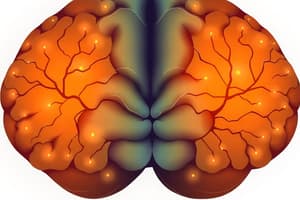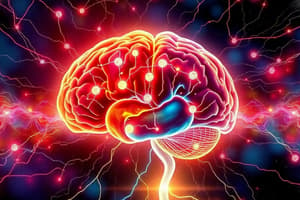Podcast
Questions and Answers
What brain structure is primarily associated with the reward pathway during the binge/intoxication stage of addiction?
What brain structure is primarily associated with the reward pathway during the binge/intoxication stage of addiction?
- Amygdala
- Insula
- Prefrontal Cortex
- Basal Ganglia (correct)
During the withdrawal/negative affect stage, which brain structure is activated, leading to increased negative mood?
During the withdrawal/negative affect stage, which brain structure is activated, leading to increased negative mood?
- Basal Ganglia
- Cerebellum
- Limbic System (correct)
- Prefrontal Cortex
Which process is directly influenced by the formation of drug-cue associations leading to cravings?
Which process is directly influenced by the formation of drug-cue associations leading to cravings?
- B process activation (correct)
- HPA axis deactivation
- Dopamine release in response to natural rewards
- Impulse control enhancement
What impaired cognitive function is a result of hypofrontality due to drug use during the preoccupation/anticipation stage?
What impaired cognitive function is a result of hypofrontality due to drug use during the preoccupation/anticipation stage?
Which brain structure is primarily responsible for forming habits associated with drug use?
Which brain structure is primarily responsible for forming habits associated with drug use?
Flashcards
Binge/Intoxication Stage
Binge/Intoxication Stage
Initial stage of addiction where drug use triggers dopamine release in the reward pathway, forming associations of drug use with cues, leading to habit formation.
Withdrawal/Negative Affect Stage
Withdrawal/Negative Affect Stage
Addiction stage marked by the brain's reward pathway becoming insensitive to rewards, triggering stress response and negative mood. It's when the "anti-reward" or the "dark side" develops
Preoccupation/Anticipation Stage
Preoccupation/Anticipation Stage
Addiction stage featuring impaired decision-making (hypofrontality) due to drug use; the brain is more sensitive to drug cues than natural rewards.
Basal Ganglia (Striatum)
Basal Ganglia (Striatum)
Signup and view all the flashcards
Incentive Salience
Incentive Salience
Signup and view all the flashcards
Study Notes
Addiction Stages and Brain Circuitry
- Binge/Intoxication Stage:
- The basal ganglia (striatum) and reward pathway are activated.
- Initial drug exposure triggers dopamine release in the reward pathway.
- Drug-cue associations form, leading to habit formation ("autopilot") in the basal ganglia.
- Dopamine release occurs in response to drug cues, not the drug itself.
- Reward deficiency may exist, where fewer D2 receptors lead to increased pleasure from stimulants.
- Withdrawal/Negative Affect Stage:
- The limbic system (amygdala) and stress system (HPA axis) are involved.
- An "anti-reward" or "dark side" develops.
- The reward pathway becomes less responsive to rewards (even natural ones).
- Brain stress systems and amygdala activity increase negative mood.
- Preoccupation/Anticipation Stage:
- The prefrontal cortex (PFC), stress system (HPA axis), basal ganglia, and insula are key.
- Executive function impairment occurs due to hypofrontality (reduced PFC activity) from drug use.
- The PFC becomes less responsive to natural rewards but more sensitive to drug cues, worsening cravings.
- The insula is sensitive to cravings (interoception).
- The stress system and basal ganglia "autopilot" remain active.
- Cravings arise from drug-cue associations triggering the "B process"
Studying That Suits You
Use AI to generate personalized quizzes and flashcards to suit your learning preferences.




